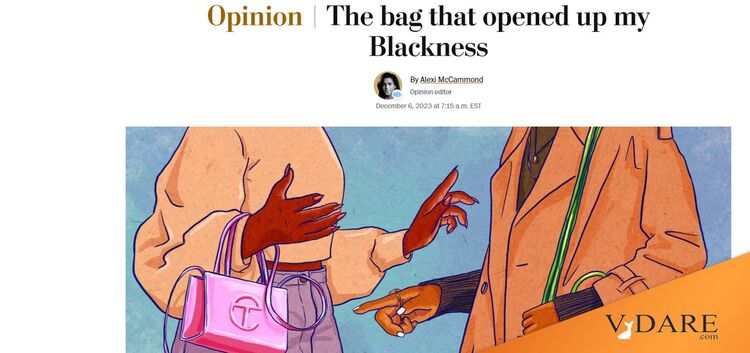
By Steve Sailer
12/10/2023
The Law of Intersectionality proves that black women, because they are women and they are black, will have the most interesting ideas. Who can even dream of all the fascinating new intellectual innovations they have in store for us?

Hence, in the Washington Post opinion section, an opinion editor tells us about such novel topics as her Blackness, her bag, her hair, and her complaints about her white mother:
The bag that opened up my Blackness
By Alexi McCammond
Opinion editor
December 6, 2023 at 7:15 a.m. EST… I got the smallest-size Telfar Shopping Bag in “Bubblegum” pink.
It’s not exactly a purse, it’s more like a fake leather version of a paper shopping bag. It was modeled on the dimensions of Bloomingdale’s paper bag.
At $150 to $257, it’s extremely expensive compared to a paper bag, but pretty cheap compared to a designer handbag.

For example, the big pink Bottega Andiamo handbag costs $7,900.
Heck, the Telfar shopping bag costs less than the (real leather) hardcover version of my new anthology.
But unlike Gucci or, really, any other big-name luxury brand, it has unexpectedly opened up so many spaces for organic Black joy and connection. …
But the “Bushwick Birkin” is more than just a designer bag — it’s the creation of Telfar Clemens, who is Black and queer. It’s an open invitation for acceptance, and one that has helped me overcome my struggle to really feel comfortable in my own skin. It has brought me into a community in which the full breadth of Blackness is on display (queer men, women, old, young, celebs and plebs), where those differences don’t matter. It’s almost like acknowledging the luxury tears down these invisible walls we otherwise erect between ourselves and strangers. We size each other up. We compare and contrast and dissect. We smile and, often, embrace. What starts as a conversation about the Telfar turns into tales of concerts and exes and nail salons.
For so long, I’ve silently struggled to feel entitled to own my Blackness. I’m biracial but was raised primarily by my mom, who is White and, honestly, not a reliable ally. Black beauty wasn’t embraced or explored in our house when I grew up. My dad worked all the time and was not particularly available, so that left my mom. She straightened and relaxed and dyed my thick, brown, curly hair. My mom is genuinely so out of touch that during one visit to the National Museum of African American History and Culture, she stopped random Black people to apologize … for … slavery? Oppression? Her outfit? I’m still not sure. (But I am certain that the memory remains just as excruciating for me.)
Yet thinking about it also exposes the pain that I feel knowing all the ways in which my mother whitewashed my sense of identity from a young age. …
A few years back, in what felt like some great step for sisterhood, I decided to wear my natural hair for the first time during a Fox News segment. “Hoping we can just leave it,” I told the in-studio hair and makeup artists when they asked what to do with it. But finding the courage to confront myself and the flatiron still wasn’t the secret to loving or communicating my identity to others.
That’s why I always walk away from these spur-of-the-moment kikis with fellow Telfar bag girlies and guys thinking to myself how lucky I am to be welcomed into and a part of this fabulous informal-yet in-the-know community centered on Black joy.
This is a content archive of VDARE.com, which Letitia James forced off of the Internet using lawfare.